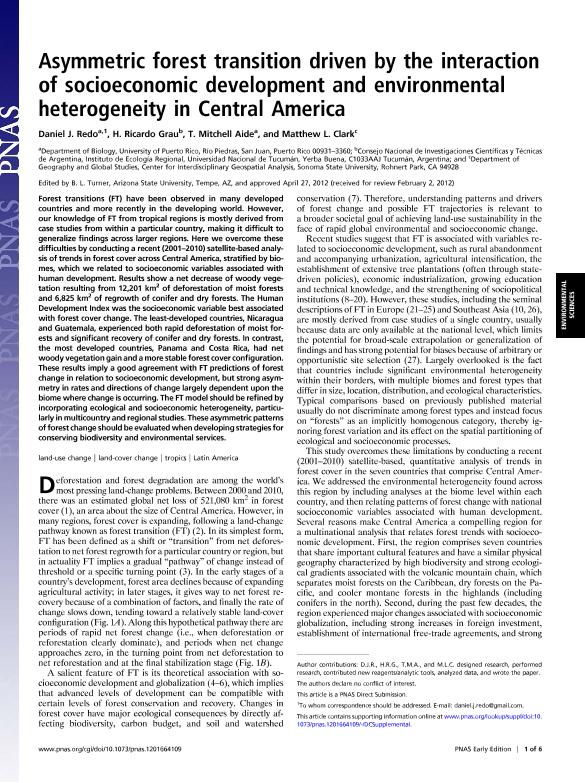Artículo
Asymmetric forest transition driven by the interaction of socioeconomic development and environmental heterogeneity in Central America
Fecha de publicación:
05/2012
Editorial:
National Academy of Sciences
Revista:
Proceedings of the National Academy of Sciences of The United States of America
ISSN:
0027-8424
Idioma:
Inglés
Tipo de recurso:
Artículo publicado
Clasificación temática:
Resumen
Forest transitions (FT) have been observed in many developed countries and more recently in the developing world. However, our knowledge of FT from tropical regions is mostly derived from case studies from within a particular country, making it difficult to generalize findings across larger regions. Here we overcome these difficulties by conducting a recent (2001-2010) satellite-based analysis of trends in forest cover across Central America, stratified by biomes, which we related to socioeconomic variables associated with human development. Results show a net decrease of woody vegetation resulting from 12,201 km2 of deforestation of moist forests and 6,825 km2 of regrowth of conifer and dry forests. The Human Development Index was the socioeconomic variable best associated with forest cover change. The least-developed countries, Nicaragua and Guatemala, experienced both rapid deforestation of moist forests and significant recovery of conifer and dry forests. In contrast, the most developed countries, Panama and Costa Rica, had net woody vegetation gain and amore stable forest cover configuration. These results imply a good agreement with FT predictions of forest change in relation to socioeconomic development, but strong asymmetry in rates and directions of change largely dependent upon the biomewhere change is occurring. The FT model should be refined by incorporating ecological and socioeconomic heterogeneity, particularly inmulticountry and regional studies. These asymmetric patterns of forest change should be evaluatedwhen developing strategies for conserving biodiversity and environmental services.
Palabras clave:
LAND-COVER CHANGE
,
LAND-USE CHANGE
,
LATIN AMERICA
,
TROPICS
Archivos asociados
Licencia
Identificadores
Colecciones
Articulos(CCT - NOA SUR)
Articulos de CTRO.CIENTIFICO TECNOL.CONICET - NOA SUR
Articulos de CTRO.CIENTIFICO TECNOL.CONICET - NOA SUR
Citación
Redo, Daniel J.; Grau, Hector Ricardo; Aide, T. Mitchell; Clark, Matthew L.; Asymmetric forest transition driven by the interaction of socioeconomic development and environmental heterogeneity in Central America; National Academy of Sciences; Proceedings of the National Academy of Sciences of The United States of America; 109; 23; 5-2012; 8839-8844
Compartir
Altmétricas




